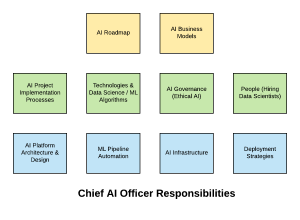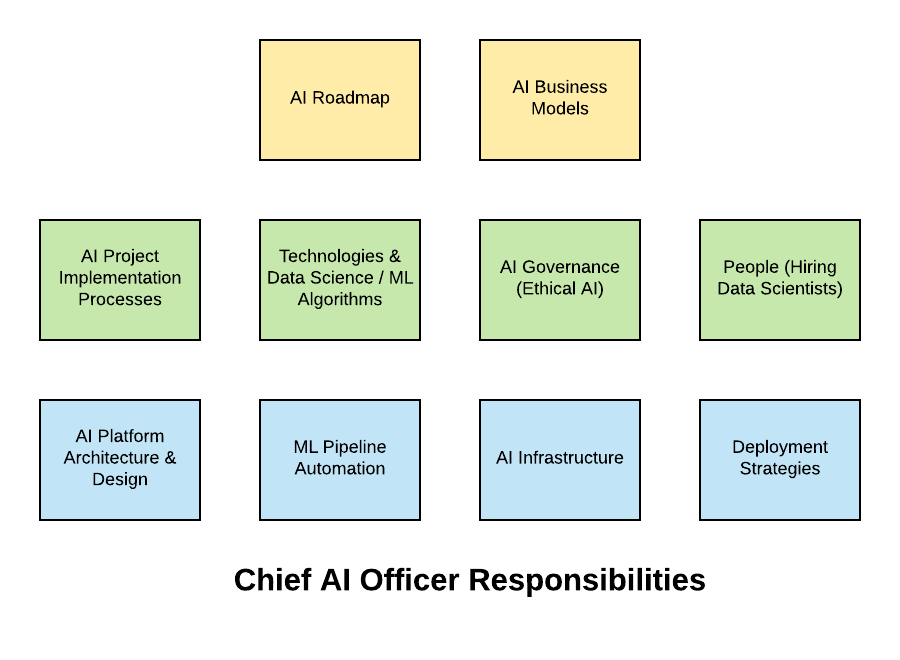
Whether your organization needs a chief artificial intelligence (AI) officer is a topic where there have been differences of opinions. However, the primary idea is to have someone who heads or leads the AI initiatives across the organization. The designation could be chief AI officer, Vice-president (VP) – AI research, Chief Analytics Officer, Chief Data Officer, AI COE Head or maybe, Chief Data Scientist etc. One must understand that building AI/machine learning models and deploying them in production is just one part of the whole story. Aspects related to AI governance (ethical AI), automation of AI/ML pipeline, infrastructure management vis-a-vis usage of cloud services, unique project implementation methodologies etc., become of prime importance once you are done with the hiring of data scientists for building the models. This is where one would need a person who leads the different AI initiatives such as the one mentioned above.
In this post, you will learn about some of the following in relation to the job description of chief AI officer:
- Roles & Responsibilities
- Skillsets
Roles & Responsibilities of Chief AI Officer
The following are some of the key areas of focus for a chief AI office:
- AI Roadmap vis-a-vis Business vision/goals/initiatives (VGIs)
- Ideas & insights into newer AI-powered business models
- Projects/products implementation methodologies/processes (agile etc.)
- AI algorithms, research & related roadmap
- Technologies & related roadmap
- AI platform/products architecture/design/implementation vis-a-vis cloud AI services
- AI governance (ethical AI) and related processes
- AI infrastructure vis-a-vis cloud AI services
- AI automation (pipeline) projects
- AI/ML models quality assurance strategy
- AI/ML models continuous delivery/deployment strategies
- Communication with customers/partners/media/internal
- Hiring/Training/Mentoring
The above could be represented as the following in form of a diagram:

Fig 1. Key Responsibilities of a Chief AI Officer
The following represents details related to some of the above:
- Identify AI projects of high business impact including both product-related projects, and also research projects. Collaborate/communicate effectively with product owners representing different product lines.
- Prepare an annual roadmap for implementation of different AI projects.
- Provide ideas and insights into new business models that could be enabled using AI. Become a go-to-guy for C-Suite executives for implementing AI in their functional areas.
- Layout the AI projects/products implementation processes (ML model development lifecycle) including project inception, exploration phase, model building phase, model deployment, and model retraining. Ensure the project implementation governance on the ongoing basis.
- Prepare the plan and oversee the implementation of the AI platform which will be used to deploy and host ML models.
- Play a key role in deciding technologies and related roadmap for development, testing, deployment of AI/machine learning models.
- Prepare the plan and oversee the implementation of quality assurance processes in relation to model testing by different stakeholders; Model performance testing, model acceptance testing by product managers/consultants/customers, other forms of testing as applicable (such as metamorphic testing, dual coding testing, blackbox, white-box testing etc)
- Prepare the plan and oversee the implementation of continuous delivery/deployment strategies (A/B testing, canary testing etc) of machine learning models.
- Prepare the strategy/plan for ethical AI and oversee its implementation across different AI projects. Get involved with the interaction related to ethical AI with stakeholders including customers/partners AI governance team, auditors, regulators on the ongoing basis.
- Prepare the plan and oversee the implementation of machine learning pipeline automation to be used for automated ML model retraining/testing across different AI projects.
- Prepare the plan and oversee the implementation of AI infrastructure to be used for model training/retraining and model deployment in production. Ensures the use of cloud services vis-a-vis local infrastructure for fulfilling different requirements.
- Hire a team of data scientists; Keep a check on newer hiring requirements on the ongoing basis. Provide training and mentoring to the team
- Take part in communication with customers, partners, media stakeholders
Skillsets – Chief AI Officer
The following are some of the technologies in which a chief AI officer would be desired to have decent knowledge:
- Up-to-date with AI research areas and current trends
- Nuances related to building machine learning models including data preparation techniques, feature engineering techniques, building machine learning (ML) models and related ML algorithms
- Stay up-to-date with current developments in the field of AI – Safe AI, Ethical AI, Fair AI etc.
- Cloud AI/ML services on AWS, GCP, Azure
- Cloud computing services
- Knowledgeable about Big Data technologies and related cloud services
- Software development lifecycle, project implementation methodologies such as agile etc
- Software engineering principles
- DevOps concepts for ML pipeline automation
- Infrastructure knowledge for deciding physical/virtual m/c for model retraining etc.
References
Summary
In this post, you learned about the job description for a chief AI officer or chief artificial intelligence officer. Primarily, a chief AI officer should be able to lead AI initiatives covering different aspects such as roadmap, project implementation methodologies/processes, technologies, governance, infrastructure and people (hiring).
- Three Approaches to Creating AI Agents: Code Examples - June 27, 2025
- What is Embodied AI? Explained with Examples - May 11, 2025
- Retrieval Augmented Generation (RAG) & LLM: Examples - February 15, 2025
I found it very helpful. However the differences are not too understandable for me